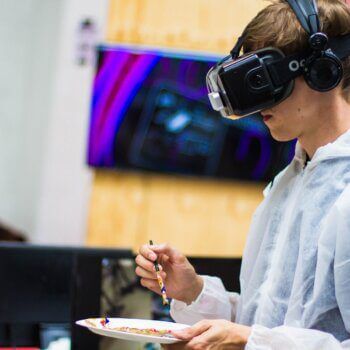With a healthy dose of curiosity and openness, four healthcare VCs shared a deeper level of what life as a VC is really like. I moderated this interesting panel — including Dr. Juan Cueva (Applied Ventures), Liz Rockett (Kaiser Permanente Ventures), Tom Egan (Optum Ventures), and Yizhen Dong (11.2 Capital) — in front of an audience of 30 Berkeley students. Some attendees asked burning questions about their dream job, while others enjoyed a crash course on the world of venture capital. I myself left with lessons that built upon what I learned in my past role in healthcare VC at OCA Ventures. It was my pleasure to moderate such an interesting and talented panel, and I wanted to share this six-section summary with those who may be interested. Enjoy!
1. What they liked about their jobs…
They learn about cool things. Inherently VCs invest in disruptive technologies with significant growth potential. Much of their week is spent learning and staying curious about cutting-edge technologies that are applied to various critical healthcare problems.
They meet smart, down to earth founders. VCs regularly meet highly-accomplished and highly-competent founders. These founders are not only very bright, but they are also down to earth. They do not have a chip on their shoulder and take the time to explain deeply technical concepts in a non-threatening way.
2. What they were unpleasantly surprised with about their jobs…
They can feel like a lone wolf. VCs eat what they kill, and they face both external and internal competition. VCs compete with folks externally, those outside their firm, and internally, for their fund’s limited time and resources. While colleagues, LPs, and advisors are willing to help, it is typically after their personal to-do lists are complete. An exception, however, is the relationship between a junior VC and a senior VC.
They spend a lot of time negotiating. Being a VC is all about deal making — before, during, and after an investment is made. So naturally, VCs must negotiate to get the most favorable outcomes. This, however, can be taxing and potentially even distracting from other important parts of the job.
They deal with failure often. Various reports exist on the mortality rate of startups, and for that matter, VC firms themselves. However, VCs believe very strongly in the upside potential of their portfolio companies; their dedication is sometimes even compared to that of a parent-child relationship! When the weather is stormy and the startup they invested in is not doing well — which can often be the case — coping is a challenge.
3. What they do to manage very ambitious ideas…
They build in dissenting views. The benefit of being a lone wolf is that there is a higher burden of proof to make decisions. This forces VCs to not make bets on phony science, teams, and business models. Beyond leveraging formal and informal expert opinions, one VC calls on a “red team” to provide an unbiased opposing view.
They keep an open mind. Like a (in)famous person said, “Healthcare is complicated.” So, while some ideas may be overly-ambitious, others may just work with effective execution. VCs oftentimes miss big opportunities by being too skeptical, so keeping an open mind can allow them to see signal in what appears to be noise.
They rely on storytelling to bring others along. Stories, more than data, can build emotional connection; therefore, VCs use stories to get buy in for ideas that on the surface seem audacious. A good story can be the difference between a moonshot’s success and failure.
4. How they do well and good…
They use their independence to invest in what they are passionate about.Another benefit of being a lone wolf is that VCs can focus their personal investment theses on what matters to them. Social impact can be an important part of the business, and VCs are free to invest in companies whose mission they are passionate about, so long as it makes sense financially.
5. What they do to be informed…
They read. VCs read a lot. Simple. Whether it is popular news, niche news, opinion pieces, or research — much of their time is spent reading.
They listen to others and build a band of supporters. VCs build both formal and informal expert networks that they can call on to find and vet deals and to help their portfolio companies. They attend many events and spend time with founders. Active listening and pattern recognition are critical skills.
6. How corporate venture capitalists (CVCs) operate…
They all are different. All CVCs look different — from LP structure to connectedness with their parent company. Some have evergreen funds that replenish each year, while others need to fundraise internally on a recurring basis, and others appeal for funding off the balance sheet for each deal. Some get investment from outside the business, while others have only one LP — the parent company. Some are only operationally and commercially connected by name, while others are specifically set up for portfolio companies to sell into the parent company.
About the Author
This article was written by Harry Goldberg, of Beyond HealthTech and BioTech startups and VC. Harry spends his time as a Berkeley MBA/MPH and a WEF Global Shaper.




























